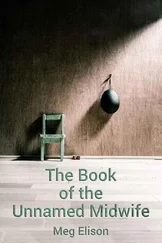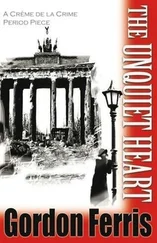In the elevator, he surprised her. “Remember how I said I was impulsive?” he asked.
“Yes.”
“Well, I say we celebrate.”
“Celebrate?”
“A drink, my treat. A deal like this can’t happen every day, can it?”
“Well. Nothing is, you know, final yet.”
She felt dull and sobering, having said that.
“I can promise you this,” he said. “I’m buying that apartment. And at this hour—”
He moved to reveal the watch beneath his cuff. She liked the watch and she liked the graceful way he brought it out into the light.
“—we can just avoid scandal.”
For one fleeting instant, her sobriety was tested as it had not been since the day Tim picked her up from Cedarview. For one fleeting instant, her way of life, necessary for normal healthy functioning, struck her as totally life less, drained of spontaneity and energy and pleasure. She wanted nothing more than to have a drink with him. She wanted to get herself lost inside the darkness of a neighborhood bar, become unrecognizable to herself, gorge on the excitement of a stranger and risk everything — the languorous mornings, the illicit lunch dates, the companionable nights — risk it all for the sake of the risk itself. Then, the moment passed.
“I’m not much of a drinker,” she said.
“Oh, don’t make me beg,” he said. “Everyone enjoys a glass of champagne.”
“Especially recovering alcoholics,” she said.
He leaned back in his tracks and winced. “That was stupid of me,” he said. “I would have never suggested.”
“How could you have known?” she said. “Don’t think a thing of it.”
“Dinner, then,” he said.
His look was unwavering. He was so prepossessing that it didn’t seem brazen. It seemed merely part of his charm that he didn’t give a damn about whether she was married or not. She was flattered, mystified, exhilarated. She was also, after a moment, steady.
“I’m having dinner with my husband tonight,” she said, just as the elevator dinged and the doors opened. He smiled and gestured for her to go first.
Walking through the lobby, she felt effervescent. She had shown resolve. They stepped out together onto Greenwich Street just as night was falling. She was surprised by the sudden chill in the air. “It’s plummeted,” she said, as her phone began to ring.
“At least it’s stopped raining,” he said.
“I have to take this,” she said to him. “I’ll just be a second.”
Later she thought back on that moment, and the ironies were not lost on her. That she was with that particular man who had the power, just in passing, to make her feel restive and extravagant, urgent, fanciful, and destructive. That such a man was buying, in essence, shelter, protection from rain and falling temperatures. That Tim calling at that very moment should have driven the final stake between her and temptation.
“Tim, are you there?”
She gestured for David to give her a minute. David opened his umbrella to shake the trapped water from its folds. There was more sound on the other end than that stillborn nothingness of a bad connection, so she persisted. “Tim?”
“It’s back.”
She turned around and looked at David. In that moment she saw more than a temptation. She saw a life.
Hang up!
So I’ve had a change of heart about dinner .
Say wrong number, say…
But first take me to a bar. Order the champagne .
Say are you there? I can’t hear you. Are you there, Tim?
Start from the beginning. Teach me everything there is to know about art .
Turn it off and throw it in the gutter.
Where do you think this piece should go — this wall here, or that one?
Jane? Jane who? You must have the wrong number.
Hurry, David, come to the window! Look at the storm gathering over the river .
I wouldn’t want to be out in that .
But it’s beautiful, isn’t it?
“Jane?” he said. “Are you there?”
“Come home,” she said.
A sudden splintering of the wind had scattered the rain like a school of silverfish. Women held their clothes to their bodies as they ran. The freak menace drove people inside, some to where they belonged, the rest to the nearest shelter. The fear was ingrained in them, bone-deep, and their reactions foretold. One or two wretches wandered around in it, indifferent to the lashings, drenched, labeled crazy to give the world its point of reference. His body moved him down the sidewalk. From the storm, the raging city edges, the clanking lanyards, the corridors of wind, the raindrops white as blisters, the windows whipping in their warped sills — from these things he had no awning under which to take cover, no deli, no lobby, no office, no Starbucks, no bedroom.
Blue security horses lay in the street. He removed his gabardine blazer and let it fall to the ground. A man came out of a doorway, one of a loose association of the ill and unkempt, and picked it up and put it on and returned to the doorway where he sheltered. The man should have followed him as he discarded the rest: his tie next; his white oxford, which he tore the buttons off and let fall some distance from the tie; his watch, which Jane had given him for a recent anniversary, sent clattering into the gutter. Rainwater backed up around the sewer drains with a gray and foamy choleric density.
His undershirt and chinos and tennis shoes were soaked through, his hair was matted and his eyes red and clenching as they struggled to make out the next step in his advance. He was trapped again in the next step, the next step and the next step. He walked across a halted intersection where the lights flashed red in both directions and long lines of cars sounded their horns down the lanes. They honked louder at his impudent passing. He paid no attention. His world had constricted. He cried out. People on the sidewalk turned.
Two pole workers were repairing a downed line at the corner.
“Did you hear that guy?”
“What was he saying?”
“Just screaming to himself.”
“About what?”
“About somebody.”
They stood in his wake and looked at him through the storm. He shed his T-shirt at last and flung the wet lump to the sidewalk, inviting the chill that came with the rain. Who did that? Who walked bare-chested through the cold rain? Maniacs. People at war with themselves. You saw them from time to time, wasted, psychotic, off their meds, poor naked wretches doomed to crime or death or jail or forced sedation. They tear a hole in the city for half a block until they disappear again inside the crowd.
The two workers turned back to the downed line, shaking their heads. He had not noticed them. His world had constricted to exclude everything but himself, and then was riven in two.
“You and me,” he cried, “you son of a bitch!”
He woke up shivering on the wet pavement in the back of a gas station. The rain had died but the wind continued to shake water from the trees and the sky was draped in folds of purple shrouds. The trees behind the station were leftovers, demarcation points convenient to separate the surrounding developments, choked at pavement’s end with crushed beer cans and soggy newspaper. The dumpster was overflowing with uncollected trash. Near one of its wheels lay an old rag. He stood and took up the rag. It folded out into a T-shirt. Though it was soaked through with rainwater, it remained stiff and required a series of shakes before he could put it on, and still it retained its bellows-like wrinkles. It was moldy and smelled of rot and advertised MasterCard, but he needed it to walk the distance up the road, past the auto-parts dealers and the fast-food franchises, so as to look presentable enough to rent a room at one of the motels. He did this, and once inside the room took the shirt off and washed it with the bar soap, scrubbing it with itself inch by inch. When he was through he wrung it out as best he could. He removed the rest of his clothes and wrung them free of the rainwater over the tub. Then he put them back on. They clung to him and that made him cold. He got under the blankets, shivering, thinking what he needed was a good fire. Instead of a fire he had free HBO. He could still smell traces of mold on the shirt. As night fell he stopped chattering and reached for his BlackBerry.
Читать дальше












